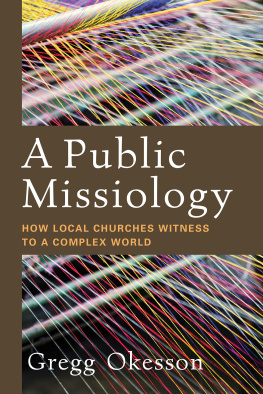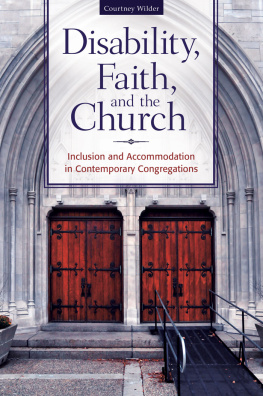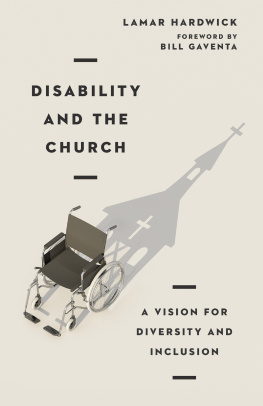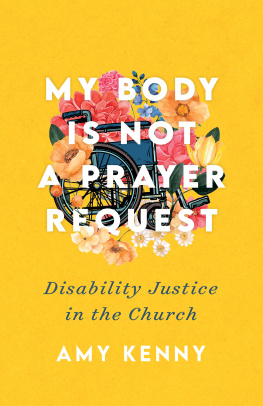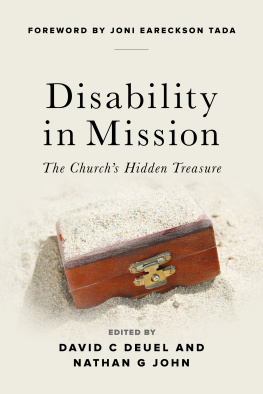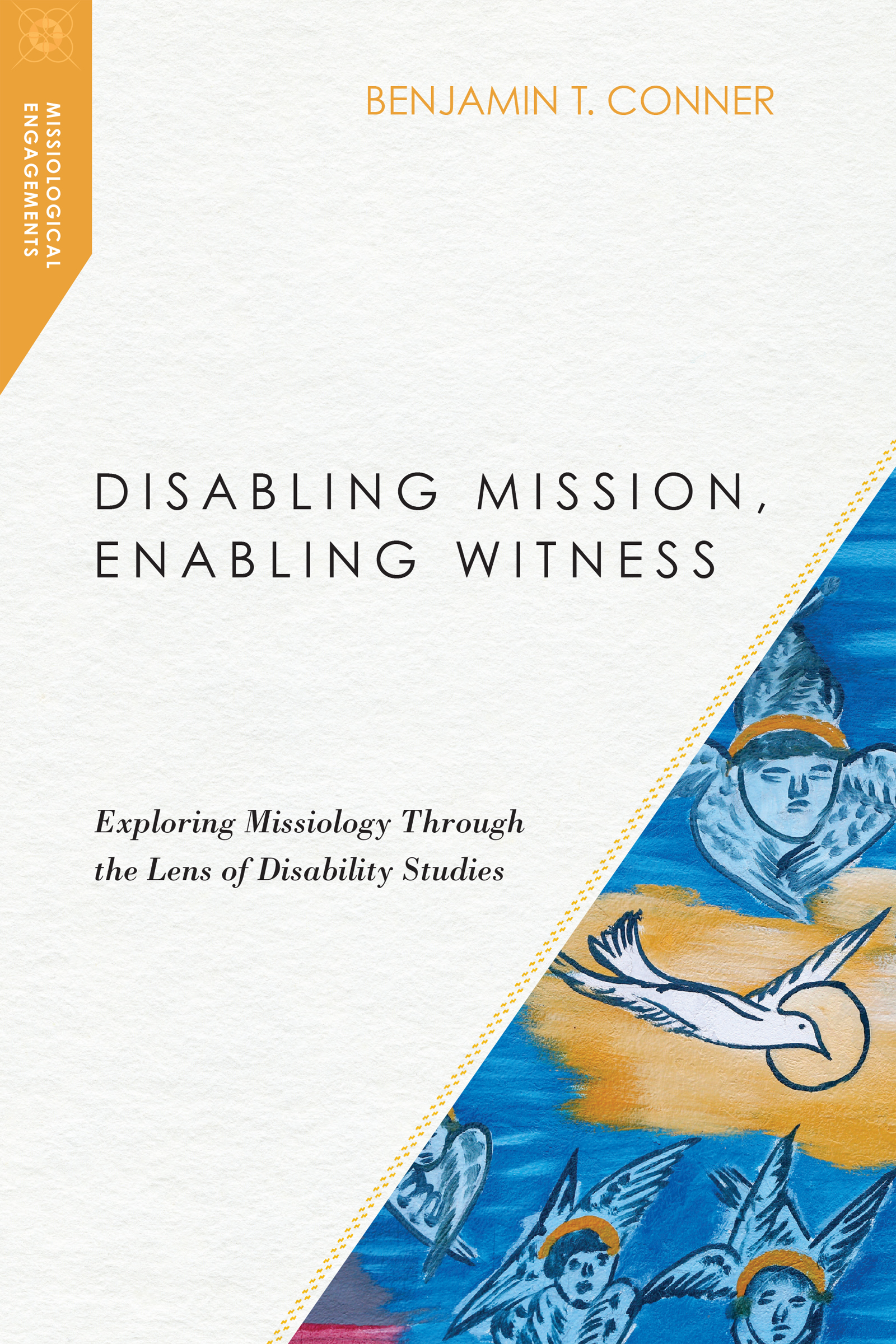DISABLING MISSION,
ENABLING WITNESS
Exploring Missiology Through
the Lens of Disability Studies
BENJAMIN T. CONNER

InterVarsity Press
P.O. Box 1400, Downers Grove, IL 60515-1426
ivpress.com
2018 by Benjamin Thomas Conner
All rights reserved. No part of this book may be reproduced in any form without written permission from InterVarsity Press.
InterVarsity Pressis the book-publishing division of InterVarsity Christian Fellowship/USA, a movement of students and faculty active on campus at hundreds of universities, colleges, and schools of nursing in the United States of America, and a member movement of the International Fellowship of Evangelical Students. For information about local and regional activities, visit intervarsity.org .
Scripture quotations, unless otherwise noted, are from the New Revised Standard Version of the Bible, copyright 1989 by the Division of Christian Education of the National Council of the Churches of Christ in the USA. Used by permission. All rights reserved.
While any stories in this book are true, some names and identifying information may have been changed to protect the privacy of individuals.
Content in chapter two adapted from Benjamin T. Conner, Enabling Witness: Disability in Missiological Perspective, Journal of Religion and Disability 19, no. 1 (2015): 15-29, is used by permission of Taylor & Francis.
The poem Culture Shock, Crip-Style by Laura Hershey (19622010), poet, writer, activist, is used courtesy of www.laurahershey.com .
Drawings throughout the book are used courtesy of the artist, Kristen Peyton.
Cover design: David Fassett
Images: Godong/UIG / Bridgeman Images
ISBN 978-0-8308-8568-8 (digital)
ISBN 978-0-8308-5102-7 (print)
Library of Congress Cataloging-in-Publication Data
A catalog record for this book is available from the Library of Congress.
To
Darrell Guder
and to
the memory of Dick Woodward
my mentors
Contents
Preface
I have been writing different parts of what feels like the same book for over a decade now. The process began when my experience with a group of young people with disabilities challenged the relevancy of my doctoral dissertation (Practicing Witness, 2011). It continued as I ministered to and with them and as they helped me to imagine a different kind of youth ministry (Amplifying Our Witness, 2012), and it now finds expression in this book. I humbly offer this work as a foundational contribution to a new conversation that brings disability studies and mission studies into dialogue about the witness of the church. I am hopeful that others will carry this work forward by refining and expanding it.
I am thankful for the many people who have provided feedback, pushback, and encouragement through this process. Early on, I was supported by a research assistant at Western Theological Seminary, Luke Soderstrom, who continues to explore the connections between disability and theology as a perpetual student. Four different Deaf people (scholars, pastors, and innovators) gave me valuable feedback: Kirk VanGilder, Tom Hudspeth, Chad Entinger, and Noah Buchholz. Bradley Nassif helped me navigate my engagement with Orthodoxy. And there were many others: from mission studies, Darrell Guder; from mission studies and disability studies, Amos Yong, who also served as an editor for this volume; from practical theology and disability studies, John Swinton; Randy Smit offered his poetry; Tom Boogaart offered his experience and wisdom; David Komline provided his expertise in American religious history for chapter three; Kristin Johnson and Jeff Monroe offered their careful editorial eyes; and the Friend residents from Friendship House offered their stories and perspectives. The Summer Institute on Theology and Disability provided a space to work through some of the ideas in this book in the form of plenary session presentations and workshops. My students in our Graduate Certificate in Disability and Ministry provided stimulating and generative conversations. Kristen Peyton ( www.kristenlied.com ) helped me demonstrate the importance of moving beyond words to communicate by creating sketches. Thanks also to Taylor and Francis for permission to use extensively Enabling Witness: Disability in Missiological Perspective in chapter two ( informaworld.com ) and to those who keep Laura Hersheys work and impact alive ( laurahershey.com ) for allowing me to use her poem Culture Shock, Crip-Style.
Finally, special thanks go to the Conner children (Tommy, Victoria, Taylor, and Tessa), who endured my present-absence at times while I contemplated and wrote what follows. And thanks to my wife, Melissa, who is always my partner in coram Deo: life lived before the face of God.
Benjamin T. Conner
Pentecost Sunday 2017
Introduction
M egan is a thirty-four-year-old woman with cerebral palsy and a significant cognitive impairment who lives in a group home. She is barely verbal, difficult to understand, and, oddly, when she does speak, says everything at least twice in direct succession. She works a few hours a day at McDonalds during the week cleaning up the dining area. On weekends, she goes to church with us. She cant read, so she makes unusual noises during the songs and the recitation of the Apostles Creed. Her friend Seth, who has Down syndrome, now comes with her, and they always sit near each other. Once when we were out of town, Megan went to church by herself. Her phone made noise during the service, and she was unable to turn it off. She left.
Do you think you know Megan?
Let me try again.
Megan is a resident at Friendship House, a residence on the campus of Western Theological Seminary where seminary students share housing with young adults with intellectual disabilities. She delights in her housemates, and they are her best friends. She sometimes exercises, prepares meals, or creates artwork with the seminary students. On World Down Syndrome Day this past year (always March 21 to symbolize the value of the extra, or third copy of, the twenty-first chromosome in people with Down syndrome), four of the Friendship House Friend residents were looking forward to being acknowledged and celebrated. affirmation, Yes, I do... yes, I do. Why should she be excluded yet again, this time because she has the wrong disability?
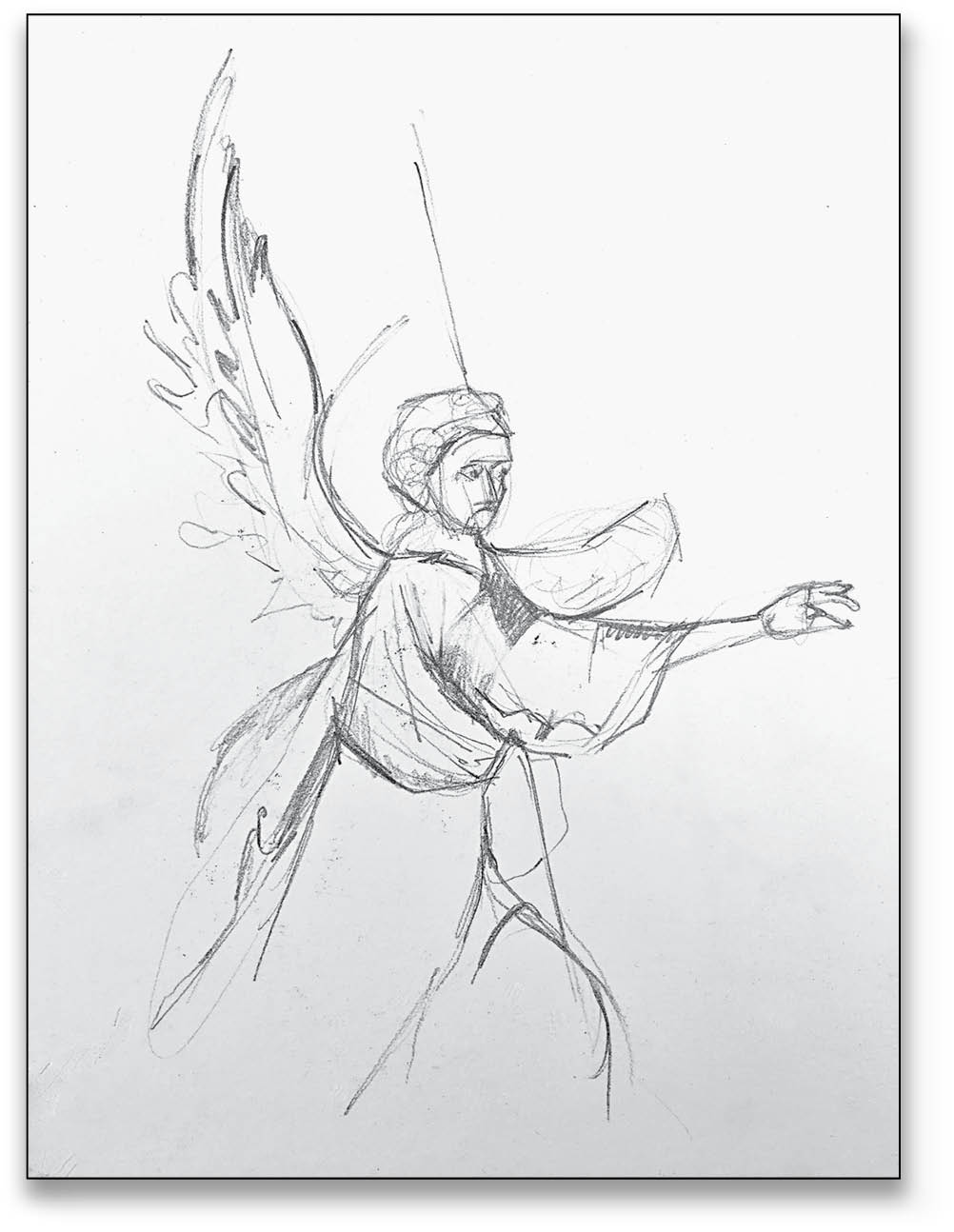
She has difficulty communicating verbally and knows it, so in an effort to make sure you can understand what she is saying, she tends to say things at least twice. Every day during the work week, Megan takes public transportation to her job. Once a week she rides horses at a therapeutic riding center. Megan has a contagious enthusiasm about church and emits a profoundly joyful and largely nonverbal witness to being included in the body of Christ. When she invited her friend Seth to attend church with her, of course he came. Everyone wants to be loved and included; everyone is looking for a place to belong. Soon after joining us at church, Seth was baptized.
One Sunday when we were out of town, Megan attended church by herself. She sat in the balcony where we often sit together. No one sat close to her. During the songs, no one found the correct pages in the hymnal for her. At some point during the service, her phone began to buzz, and she was unable to turn it off. People around her shushed her and looked at her in a way that she interpreted as harsh and angry. No one helped her. She began to cry. No one comforted her. She quickly left church, ran home, and cried. In the three years we have known her, Megan and her friends from Friendship House have the chance to gather and share highs and lows from the week with my wife and each other. In that time she has had only two lows. One was when my son stopped by McDonalds when she was working; he didnt see her, so he did not greet her. The other low was when her congregation failed her: they didnt make room for her, didnt value her contribution to the church, and didnt seem to want her witness.


